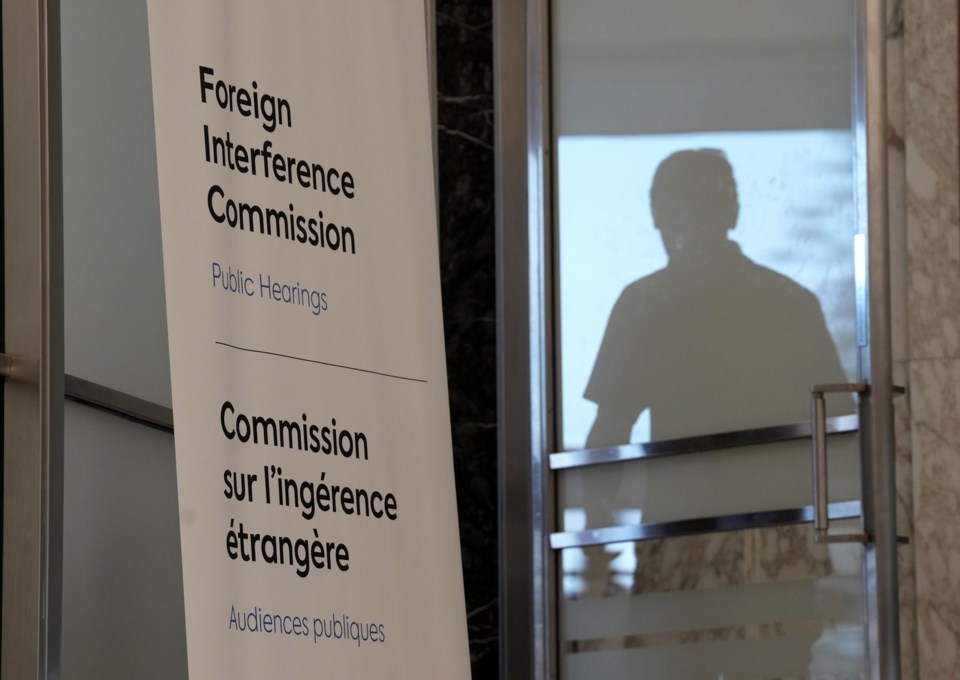OTTAWA ΓÇö Canada's chief electoral officer is playing down any suggestion that Elections Canada should directly administer political nomination or leadership contests.
During an appearance at a federal inquiry into foreign interference, Stéphane Perrault pointed to the importance of parties controlling their own processes and indicated his agency lacks the resources to administer such contests in any event.
Elections Canada has suggested possible changes to safeguard nominations, including barring non-citizens from helping choose candidates, requiring parties to publish contest rules and explicitly outlawing behaviour such as voting more than once.
However, representatives of some parties have told the federal commission of inquiry that such changes may be unwelcome, difficult to implement or counterproductive.
A report released in June by the National Security and Intelligence Committee of Parliamentarians expressed concern about how easily foreign actors can take advantage of loopholes and vulnerabilities to support preferred candidates.
Perrault said both that committeeΓÇÖs work and testimony heard at the inquiry "have highlighted the vulnerability of nomination contests in particular, but also leadership contests, to potential cases of foreign interference."
"I think the trust of Canadians has been shaken in that regard."
In the August interview with the commission, Perrault noted Elections Canada is a "centralized organization that springs into life in electoral districts across Canada when an election is called," the summary says.
"It does not have the local structures or resources to engage in the ongoing type of operations that would be required to administer nomination and leadership contests across the country."
Perrault noted that in Canada these contests can occur at any time, including during an election period, while non-fixed date elections and byelections add to the complexity.
He told the commission Tuesday that Elections Canada was aware of about 850 nomination contests in the lead-up to the 2019 election and about 700 ahead of the 2021 vote.
"The timing of these are unknown, the duration of these are unknown to us," he said. "They may be a few hours and a few weeks long, but that varies from party to party. Elections Canada does not have a permanent decentralized infrastructure to deal with that kind of administration."
Perrault said in August that, to his knowledge, no electoral authority in the world with a comparable system administers nomination contests for political parties.
He also spoke about "the importance of party autonomy, and the important value of permitting political parties to establish their own rules and procedures for selecting their leaders and candidates," the summary says.
Asked to elaborate on those comments during his appearance, Perrault said the decision of who runs under the party banner is "at the core of political partiesΓÇÖ freedom, in my view, just as much as deciding what their party platform is."
He told the commission that just because Elections Canada is not able to itself administer nomination contests "it doesn't mean that the rules or the safeguards around nomination leadership contests cannot be improved."
Perrault said Elections Canada had not yet finalized its recommendations.
The inquiry also delved Tuesday into a cyberattack directed at parliamentarians.
Senate officials say they were told in January 2021 about phishing emails targeting parliamentary accounts ΓÇö attacks that were later attributed to hackers acting on behalf of Beijing.
Some of the emails made it through firewalls and landed in senators' email inboxes, but no one opened the messages and the attackers did not gain access to information on Senate servers, the officials say.
They described the chain of events in an interview earlier this month with inquiry counsel. A summary of the conversation was presented Tuesday during inquiry hearings.
The officials said senators' offices were immediately contacted to ensure any emails were destroyed, and the upper chamber's information services directorate did a search of the Senate database to check that emails were deleted.
It emerged earlier this year that some MPs and senators faced cyberattacks from the hackers because of their involvement with the Inter-Parliamentary Alliance on China, which pushes for accountability from Beijing.
Early on, however, the Senate's information services directorate was not aware the attack might have been conducted by Chinese hackers.
In any event, the Senate officials told the commission, knowing the source of the attack earlier would not have changed the directorate's prompt response.
"We treat all these threats seriously, and we act quickly," David Vatcher, director of Senate information services, testified at the inquiry Tuesday.
Vatcher said the number of attacks linked to foreign states is increasing but represents a minority of the overall attacks the upper chamber faces.
However, he said, the "geopolitical climate is very tense, and it would be crazy to think that these attacks are not going to continue increasing in number and in level of sophistication."
Benoit Dicaire, a House of Commons official responsible for information technology, told the inquiry that phishing emails intended for eight MPs were quarantined by a security feature and never reached the members.
There are indications that some MPs' personal addresses received the messages, but these accounts are beyond House of Commons jurisdiction.
- With files from Anja Karadeglija.
This report by The Canadian Press was first published Sept. 24, 2024.
Jim Bronskill, The Canadian Press




